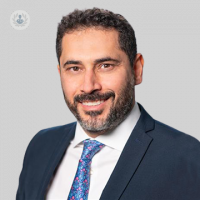Here, the topic of minimally invasive parathyroidectomy is discussed thoroughly by highly regarded consultant thyroid and endocrine surgeon, Mr Tarek Abdel-Aziz.

What is minimally invasive parathyroidectomy?
Minimally invasive parathyroidectomy (MIP) is a cutting-edge surgical procedure used to treat hyperparathyroidism, a condition caused by overactive parathyroid glands. These small glands, located behind the thyroid in the neck, regulate calcium levels in the blood.
When one or more of the glands become overactive, they produce excessive parathyroid hormone (PTH), leading to high calcium levels. This can result in symptoms such as fatigue, bone pain, kidney stones, and even osteoporosis. MIP offers a highly effective solution for patients with this condition while minimising recovery time and surgical risks.
Benefits
One of the key benefits of minimally invasive parathyroidectomy is that it uses advanced imaging techniques, such as ultrasound and sestamibi scans, to pinpoint the overactive gland before surgery. Once the exact location is identified, the surgeon makes a small incision (usually less than 2 centimeters) in the neck.
Through this small opening, the surgeon removes the affected parathyroid gland, leaving the healthy glands intact. This targeted approach contrasts with traditional parathyroid surgery, which requires a larger incision and more extensive exploration of the neck.
The advantages of MIP are numerous. First and foremost, it offers a much shorter recovery time compared to traditional surgery. Most patients can go home the same day or the next day and resume normal activities within a few days.
Mr Abdel-Aziz routinely uses Intraoperative parathyroid hormone monitoring which is very helpful in ruling out a second adenoma/multi-gland disease. He also uses nerve monitoring systems in every case to ensure that the voice quality is not affected after surgery.
The smaller incision results in less pain, a lower risk of complications such as infection, and minimal scarring. Additionally, MIP is associated with a high success rate, particularly for patients with single-gland disease, which is the most common form of hyperparathyroidism.
Suitability
While minimally invasive parathyroidectomy is highly effective, it may not be suitable for everyone. Patients with multi-gland disease or those who have had previous neck surgery may require a more traditional surgical approach. However, for most patients with localized parathyroid disease, MIP provides an excellent solution that combines precision, safety, and faster recovery.
In conclusion, minimally invasive parathyroidectomy is a modern, less invasive approach that offers a safe and effective treatment option for hyperparathyroidism. By allowing for quicker recovery and less discomfort, MIP has become the preferred surgical method for treating this condition.



